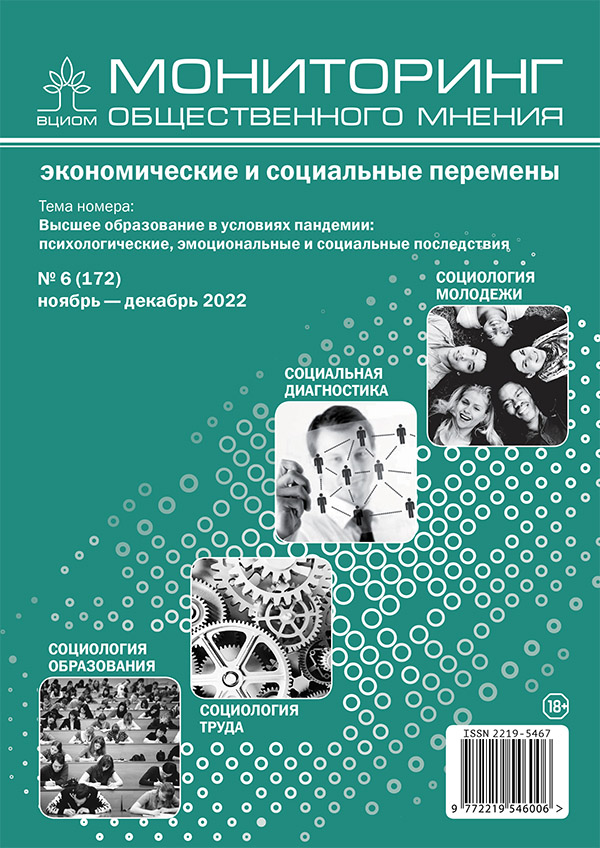Готовность студентов университетов к эффективному межкультурному взаимодействию в условиях пандемии: роль страха перед COVID-19 (российский опыт)
DOI:
https://doi.org/10.14515/monitoring.2022.6.2261Ключевые слова:
пандемия COVID-19, страх перед COVID-19, межкультурное взаимодействие, межкультурная компетентность, российская студенческая молодежьАннотация
В статье представлены результаты онлайн-опроса, проведенного в январе — апреле 2021 г. среди студентов университетов — граждан России (579 человек) в возрасте от 18 до 25 лет. Цель исследования — изучение характера связей психофизиологических и психоэмоциональных проявлений страха перед COVID-19 (как маркеров дисфункционального и функционального страхов) с показателями готовности к эффективному межкультурному взаимодействию. Проверялись две гипотезы: о наличии отрицательных связей проявлений дисфункционального страха (1) и отсутствии связей проявлений функционального страха перед COVID-19 (2) с компонентами межкультурной компетентности (как маркерами готовности студентов к эффективному межкультурному взаимодействию) в условиях пандемии. В опросе использовались Шкала страха COVID-19 (FCV-19S) и «Интегративный опросник межкультурной компетентности». Проведен множественный регрессионный анализ с контролем переменных (пол, возраст, материальное положение, владение иностранными языками, опыт международной мобильности, уровень религиозности, объективная дистанция с COVID-19).
В результате исследования первая гипотеза была подтверждена полностью, вторая — частично. Выявлено, что дисфункциональный страх перед COVID-19 может препятствовать эффективному межкультурному взаимодействию в среде российской студенческой молодежи в период пандемии, в то время как функциональный страх перед COVID-19, напротив, может способствовать росту такого показателя межкультурной компетентности, как склонность к управлению межкультурным взаимодействием. Снижение готовности к продуктивному межкультурному взаимодействию в условиях пандемии в среде студенческой молодежи с выраженным дисфункциональным страхом коронавируса может объясняться механизмами развития ксенофобии и предубеждений в ситуации угрозы, а также являться следствием психологического механизма регрессии, актуализирующегося в условиях сильного негативного эмоционального переживания. Положительный же вклад функционального страха COVID-19 в склонность к управлению межкультурным взаимодействием может быть следствием реализации потребности студентов в контроле за неопределенной ситуацией в условиях пандемии, что проявляется в том числе и в сфере межкультурной коммуникации.
Благодарность. Исследование проведено в рамках Программы фундаментальных исследований Национального исследовательского университета «Высшая школа экономики».
Загрузки
Опубликован
Как цитировать
Выпуск
Раздел
Лицензия
Copyright (c) 2022 Мониторинг общественного мнения: экономические и социальные перемены

Это произведение доступно по лицензии Creative Commons «Attribution-NonCommercial-ShareAlike» («Атрибуция — Некоммерческое использование — На тех же условиях») 4.0 Всемирная.






